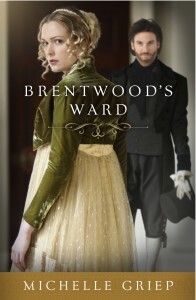Vanessa Riley's Blog, page 26
June 10, 2025
Dressing Up is Fun To Do
People love dressing up—masks, costumes, accessories, face paint. There is just something about putting on a creative outfit and possibly even talking in a different accent than normal that makes people giddy.

 Kids in costume via wikimedia commons
Kids in costume via wikimedia commonsNext month trick-or-treaters will dress as goblins, princesses, and pirates and greet neighbors with squeals of delight at the candy given out to fill their pillowcases. Those couple of hours of make-believe brings a thrill for children that equates almost with the excitement of opening gifts on Christmas morning.
Little ones often love wearing play clothes out and about. At five years old, for example, a little girl doesn’t understand why wearing a tutu to the grocery store could elicit some strange looks from passer-by. And at five-years old, she probably wouldn’t get those looks. Why is that?
Children are not alone in the fun of imagination. Despite that Halloween is meant to be celebrated by children just one day a year, plenty of occasions merit adults dressing up simply for the pleasure of creating a world different from their own.
Just as little ones enjoy wearing princess gowns or pirate peg-legs, some adults pull costumes out of their closets for some good, old-fashioned make-believe. Chances are, though, a thirty-year-old woman walking down the street in a Victorian ball gown will get more than strange looks from her neighbor…she’ll probably be gossiped about for not living in the real world. Is it a shame or a necessity that adults are expected to resist the pull of make-believe?
Dressing Like Fanny or Dancing Like Jane
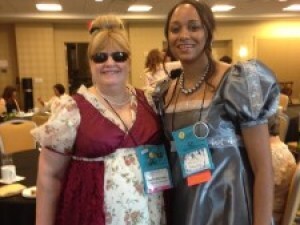 Laurie Alice Eakes and Vanessa Riley in their Regency gowns.
Laurie Alice Eakes and Vanessa Riley in their Regency gowns.Jane Austen fans are no strangers to playing dress up. More often than not, someone who reads Austen novels desires to travel back to the nineteenth century for a taste of ballroom dances and strolls around the local park.
Plenty of book clubs and blog sites exist to captivate these readers, but nothing like wearing a floor-length muslin gown and bonnet bedecked in ribbons makes a lady feel like she belongs in the English countryside.
Now picture attending the Jane Austen Festival in Bath, England—men and women from all over the world travel to Austen’s hometown for a week of living as one of her characters and you can join!
This isn’t dressing up for the fainthearted: be prepared for character role play with no modern amenities allowed. Ladies, if you want to meet your Mr. Darcy, you had best be willing to forgo your cell phone and Facebook.
Be Yourself—Without the Costume
The problem with pretending to be a goblin, a priest, a pirate, a princess, or even just a lady of the Regency is that dressing up encourages behavior not always applicable to real world situations.
Yes, attending balls and visiting family for months on end—practices common in Austen’s day—are admirable; however, those wishing for society to revert back to nineteenth century behaviors are in for a long fight.
Technological advances mean people have access to more information than ever before, and with that access comes increased education and independence. That being said, is it fair, Ladies, to hold your husbands to Mr. Darcy’s standards when you want the right to hold a job and wear pants? Can you reasonably expect men to hold open doors for you when sometimes they do so and women snap back at them for old-fashioned habits?
Bringing Austen to Modern Day
Popularity of Austen novels continues to grow even with the modernization of society. Readers love old-fashioned stories for originality and universality of characters; fan-fiction of all six of Austen’s novels prove that two-hundred year-old tales still apply to an increasingly fast-paced world.
The challenge today is to find a balance between retaining the behaviors and morals that emphasize propriety while accepting ideals that highlight educational advancement.
It may be impossible to live at Longbourne with the Bennett family, but once in a while it is alright to live vicariously through a Pride and Prejudice movie. Just be sure to leave your muslin dress in the closet for the rest of the year.
Originally posted 2014-09-18 01:00:00.

Who Were the Bow Street Runners?
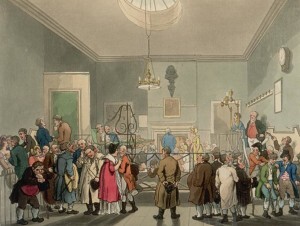 The courtroom at #4 Bow Street.
The courtroom at #4 Bow Street.Traditionally, every male householder in London was expected to police the streets in their neighborhood, and every citizen was to report anyone they witnessed committing a crime. This changed in the eighteenth century because of increasing concerns about the threat of dangerous criminals who were attracted by the growing wealth of London’s middle class.

Prompted by a post-war crime wave in 1749, Magistrate Henry Fielding (who himself was a playwright and novelist) hired a small group of men to locate and arrest serious offenders. He operated out of No. 4 Bow Street, hence the name “Bow Street Runners.”
 Magistrate Henry Fielding
Magistrate Henry FieldingFielding petitioned the government and received funding, but even so, he soon ran out of money to pay these men a worthy salary. Still, the Runners were committed to justice, so they took on odd jobs such as watchmen or detectives for hire or even—as in the case of Nicholas Brentwood, the hero in my upcoming release Brentwood’s Ward—guarding people or treasures.
What attracted my interest as an author was an old newspaper advertisement put out by Fielding. It encouraged the public to send a note to Bow Street as soon as any serious crime occurred so that “a set of brave fellows could immediately be dispatched in pursuit of the villains.” I wondered about those “brave fellows” and what kind of villains they might come up against, and thus was born Nicholas Brentwood.
Despite Bow Street’s efforts, most Londoners were opposed to the development of an organized police force. The English tradition of local government was ingrained deeply, and they feared the loss of individual liberty. So, as gallant as the Runners were in tracking down criminals, the general public did not always view them in a positive light. Even the nickname given them by the public—Bow Street Runners—was considered derogatory and was a title the officers never used to refer to themselves.
Bow Street eventually gave way to the Metropolitan Police, and by 1839, the Runners were completely disbanded. But that doesn’t mean you can’t still read about them . . .
BRENTWOOD’S WARD (pre-orders available)
Place an unpolished lawman named Nicholas Brentwood as guardian over a spoiled, pompous beauty named Emily Payne and what do you get? More trouble than Brentwood bargains for. She is determined to find a husband this season. He just wants the large fee her father will pay him to help his ailing sister. After a series of dire mishaps, both their desires are thwarted, but each discovers that no matter what, God is in charge.
Originally posted 2014-09-15 01:00:00.

June 9, 2025
Titles from my Favorite Regency Writer, by Susan Karsten
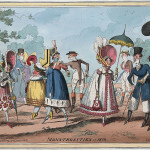
Hi, Regency fans! I got into reading regency fiction when my children were young. I needed something enjoyable, light, and clean to have on hand whenever I had a few spare minutes to read.

One day, at my library, I stumbled across a book from the House for the Season series, by Marion Chesney — the rest is history — regency era history. She’s still my favorite regency fiction author, and I only wish she still wrote in the genre. Following is a list of her prolific output (Enjoy!):
Regency Gold (1980)Lady Margery’s Intrigue (1980)The Constant Companion (1980)Quadrille (1981)My Lords, Ladies and Marjorie (1981)The Ghost and Lady Alice (1982)Love and Lady Lovelace (1982)Duke’s Diamonds (1982)The Flirt (1985)At The Sign of the Golden Pineapple (1987)Miss Davenport’s Christmas (1993)The Chocolate Debutante (1998)Westerby[edit]The Westerby Inheritance (1982)The Westerby Sisters (1982)The Six Sisters[edit]Minerva (1983)The Taming of Annabelle (1983)Deirdre and Desire (1984)Daphne (1984)Diana the Huntress (1985)Frederica in Fashion (1985)A House for the Season Series[edit]The Miser of Mayfair (1986)Plain Jane (1986)The Wicked Godmother (1987)Rake’s Progress (1987)The Adventuress (1987)Rainbird’s Revenge (1988)The School for Manners[edit]Refining Felicity (1988)Perfecting Fiona (1989)Enlightening Delilah (1989)Finessing Clarissa (1989)Animating Maria (1990)Marrying Harriet (1990)Waverley Women[edit]The First Rebellion (1989)Silken Bonds (1989)The Love Match (1989)The Travelling Matchmaker[edit]Emily Goes to Exeter (1990)Belinda Goes to Bath (1991)Penelope Goes to Portsmouth (1991)Beatrice Goes to Brighton (1991)Deborah Goes to Dover (1992)Yvonne Goes to York (1992)Poor relation[edit]Lady Fortescue Steps Out (1993)Miss Tonks Turns to Crime (1993) aka Miss Tonks Takes a RiskMrs. Budley Falls From Grace (1993)Sir Philip’s Folly (1993)Colonel Sandhurst to the Rescue (1994)Back in Society (1994)The Daughters of Mannerling[edit]The Banishment (1995)The Intrigue (1995)The Deception (1996)The Folly (1996)The Romance (1997)The Homecoming (1997)
PS: This is not Christian fiction, but is pretty clean.
Would love to hear from other Chesney fans in the comments. Fondly, Susan
Originally posted 2014-09-11 01:00:00.

Can She Get the Title?
Before I start, I’d like to break some news. The Duchess of Cambridge is with babe again!!! The future king will now have a sibling.

 The Duchess of Cambridge
The Duchess of CambridgeSource: The Daily Mail
With the Succession Act passed in 2011 and all the hold outs territories of St Kitts and Nevis, St Vincent and the Grenadines, and Canada changing their laws to allow a female to become ruler regardless of a subsequent male sibling, a baby George had been Georgette, she would someday be Queen of England. For now this new baby male or female will fourth in line to the throne.
NEW LINE OF SUCCESSION Prince Charles Prince William Prince George (William and Catherine’s son)New Baby Prince Harry Prince Andrew Princess Beatrice Princess Eugenie Prince Edward Viscount Severn The Lady Louise Windsor Princess Anne Peter Phillips Savannah Phillips Ilsa Phillips Zara Phillips
Yeah progress. However, back in the Regency we so love, females taking their father’s position was rare, even more so for the lower titles.
Take a look at this list:
Upon the death of the title holder, the title passes in this order:
Eldest sonEldest son’s eldest sonEldest son’s eldest son’s eldest son (until there are none left)Second sonSecond son’s eldest son (until this is exhausted)Any remaining son in order of birthEldest brother of the title holderEldest brother’s eldest son (or any other son until this is exhausted)Second eldest brother (and so on until this is exhausted)Eldest surviving male descended from the original title holderNotice the lack of females. Titles were typically passed to males, not females. However, there have been rare exceptions. The 2nd Duchess of Marlborough, Henrietta Churchill is one. The 1st Duke of Marlborough was given special permission in 1706 to pass his title to his daughter. He was a war hero with no living sons. She became the Duchess of Marlborough in 1722.
 Portrait of Henrietta Godolphin, 2nd Duchess of Marlborough
Portrait of Henrietta Godolphin, 2nd Duchess of MarlboroughSource: Wiki Commons
So when ever you hear never, always realize that there may be some obscure exception lurking in the annals of history. In my latest release coming September 29th, Swept Away, Charlotte Downing is given her father’s title in this retelling of Cinderella with a Twist.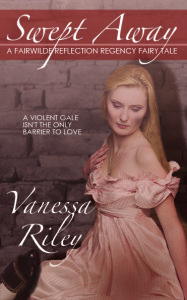
If you could inherit any title other than King or Queen what would it be? I for one, fancy duchess. The Duchess of Georgiaporchdom. What about you?
References:
Read more: http://www.dailymail.co.uk/news/article-2373257/Royal-baby-news-If-Kate-Middleton-girl-WILL-Queen-Cameron-insists.html#ixzz3CkddcLHW
Originally posted 2014-09-08 15:21:29.

June 8, 2025
Pelisses, Spencers, and Redingotes, Oh my!
Women never just wear a coat in Regency books. What is the difference between a pelisse and a spencer jacket?

There were three types of jackets for females in Regency England. The redingote, pelisse, and spencer.
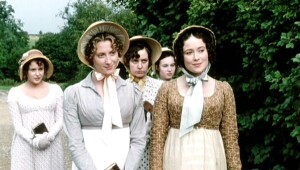 Spencer jackets worn by the Jane and Elizabeth Bennet in 1995’s Pride and Prejudice.
Spencer jackets worn by the Jane and Elizabeth Bennet in 1995’s Pride and Prejudice.The Spencer Jacket
Spencer jackets were short and followed the bodice lines of the dress. These were inspired by the tailless men’s top coats of the late 18th century. The men’s coat were believed to come into fashion after the Earl of Spencer singed the tails on his coat and had them trimmed off. Hence the name Spencer Jacket.
 Pelisse from 1811, notice how the closures run all the way down the garment
Pelisse from 1811, notice how the closures run all the way down the garmentThe Pelisse
Pelisses also followed the line of the dress, but they went much longer. When completely buttoned, the pelisse could hide all but the hem of the dress underneath. It was almost like wearing an entire second dress which would be necessary during colder time periods because the women’s dresses were very thin.
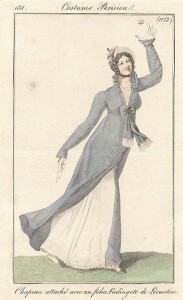 A Regency redingote where the fastenings are only over the bodice.
A Regency redingote where the fastenings are only over the bodice.The Redingote
Similar to the pelisse, the redingote is long. However, it does not close completely in the front. As the Regency faded and skirts began to widen and grow, the Redingote became a favored outer garment because it revealed the dress beneath and didn’t have to close over an enlarged skirt.
Visit our question page to tell us what you’d like to know about Regency England.
What’s your favorite style of jacket?
Originally posted 2014-09-04 05:00:00.

What does it mean when an estate is “entailed”?
Pride and Prejudice, Downton Abbey, and countless other period pieces use an entailed estate as a key plot element.

But what is an entailed estate?
Simply stated, an entailment meant that the estate had to be inherited by a male. For example, Mr. and Mrs. Bennet had five daughters. No sons. Therefore the estate passed to the closest male heir.
(For more on finding the closest male heir, look at this post.)
In order for an estate to be entailed, one of two scenarios had to happen.
SCENARIO ONE
The possessor of the land didn’t own the property outright. Many years prior, an ancestor of his had been granted the ability to live on it as if it were his own, but since he didn’t own it, he couldn’t will it to whomever he wished.
This granting of land had restrictions on transfer. There were several types of restrictions that could have been placed on the land. Sometimes it was stated that it could only pass to his biological children. Other times, as in the case of P&P and Downton Abbey it was restricted to male biological heirs.
With enough time and money, this could be avoided through legal loopholes that had become common practice by the Regency.
SCENARIO TWO
The property is owned outright, but the somewhere down the line, the estate had been willed as a “life estate”. This meant the male heir had ownership for his lifetime, but he couldn’t sell it because once he was dead, it was already willed to his next male heir.
This is likely the type of scenario that causes problems for our Regency heros and heroines because it was very difficult to get around.
So not all land was entailed and not all land had to go to the first male heir. If there were no restrictions and a man (or woman) owned the property outright, they could will it to whomever they wished whether son, daughter, brother, cousin, or servant.
Got a question you’d like us to answer? Check out our new questions page to submit it.
Originally posted 2014-09-01 13:32:07.

June 7, 2025
Guest Post: Why the Classics Live On
Walk into any bookstore or watch previews of upcoming movies, and you’ll surely come across numerous advertisements or displays of classic stories written many years ago. Barnes and Noble consistently presents a few tables of the Classics in its stores. Every few minutes a trailer for Les Miserables or Anna Karenina shows on television. With each bestseller and Oscar-worthy movie comes a retelling of one of the well-known stories taught in English classes.

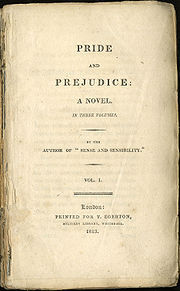 What is it that endears the public to the Classics? With the advent of three-dimensional directing, popular vampire lore, beloved magical adventures, and modern romance stories that fill the bookshelves and movie theaters, audiences do not lack amusing entertainment. Critics could argue, in fact, that Austen, Dickens, and Tolstoy are authors of the past. Why look back when there are unknown tales waiting to be told?
What is it that endears the public to the Classics? With the advent of three-dimensional directing, popular vampire lore, beloved magical adventures, and modern romance stories that fill the bookshelves and movie theaters, audiences do not lack amusing entertainment. Critics could argue, in fact, that Austen, Dickens, and Tolstoy are authors of the past. Why look back when there are unknown tales waiting to be told?
And yet, retellings of Pride and Prejudice, Wuthering Heights, Jane Eyre, and other Classics continue to come to theaters and bookstores in droves. Whether authors create fan fiction of the beloved novels or directors discover new techniques with which to tell the stories, without a doubt some retelling is bound to catch your fancy.
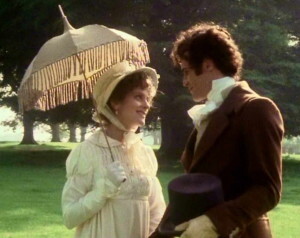 Jane Austen’s novels are a particular favorite of authors and directors alike to recreate and maneuver to the readers’ and viewers’ delight. In the two hundred (almost) years since Austen’s novels first hit the market, the fan fiction and movies created for audiences are too numerous to count. Pride and Prejudice, in particular, is an audience favorite. Can you blame the viewers of the 1990s BBC-miniseries version for watching the movie numerous times—after all, who doesn’t enjoy watching Colin Firth walking out of Pemberley’s lake dripping wet? (Try to keep your anger in check, P and P novel enthusiasts. We know this scene doesn’t occur in the book.) Austen, known best for her characters that pursue love in spite of difficult situations, wrote novels that connect with young and old, male and female alike (although females probably enjoy the stories more than their male counterparts). Turning these novels into fan fiction and movies is a sure-fire way to connect with book readers and movie watchers.
Jane Austen’s novels are a particular favorite of authors and directors alike to recreate and maneuver to the readers’ and viewers’ delight. In the two hundred (almost) years since Austen’s novels first hit the market, the fan fiction and movies created for audiences are too numerous to count. Pride and Prejudice, in particular, is an audience favorite. Can you blame the viewers of the 1990s BBC-miniseries version for watching the movie numerous times—after all, who doesn’t enjoy watching Colin Firth walking out of Pemberley’s lake dripping wet? (Try to keep your anger in check, P and P novel enthusiasts. We know this scene doesn’t occur in the book.) Austen, known best for her characters that pursue love in spite of difficult situations, wrote novels that connect with young and old, male and female alike (although females probably enjoy the stories more than their male counterparts). Turning these novels into fan fiction and movies is a sure-fire way to connect with book readers and movie watchers.
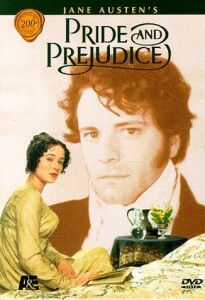 So what is it about the Classics that resonates so soundly with audiences? With Austen retellings, I’m convinced that readers and viewers live vicariously through the characters. Yes, every movie-goer and novel-reader places themselves in whatever their escape pleasure is—that’s the point of reading or watching, isn’t it? To be swept away to another world? Google-search the Jane Austen Festival, and you’ll see that while Persuasion doesn’t have witches or goblins and Emma doesn’t take place in a haunted mansion, readers of Austen novels and viewers of the novels’ movie counterparts are just as swept away by the stories as anyone reading Harry Potter or Twilight. Men and women dress in Regency costumes, attend balls, put on theatricals, and host luncheons and dinners, all in the fashion of Jane Austen’s time.
So what is it about the Classics that resonates so soundly with audiences? With Austen retellings, I’m convinced that readers and viewers live vicariously through the characters. Yes, every movie-goer and novel-reader places themselves in whatever their escape pleasure is—that’s the point of reading or watching, isn’t it? To be swept away to another world? Google-search the Jane Austen Festival, and you’ll see that while Persuasion doesn’t have witches or goblins and Emma doesn’t take place in a haunted mansion, readers of Austen novels and viewers of the novels’ movie counterparts are just as swept away by the stories as anyone reading Harry Potter or Twilight. Men and women dress in Regency costumes, attend balls, put on theatricals, and host luncheons and dinners, all in the fashion of Jane Austen’s time.
Audiences love Austen because her characters live and love through the same situations people experience today. Are you pining for someone you can’t have? Don’t go running to the freezer for Ben and Jerry’s—Pride and Prejudice will give you hope for that relationship much more than a pint of vanilla ice cream will. Contemplating giving relationship advice to your best friend? Read Emma before setting her up with that lothario from work… your friendship will thank you.
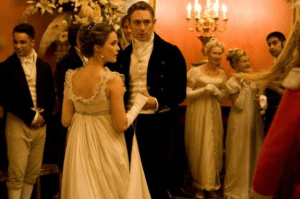 It’s simple, really. Readers and watchers (okay, most likely females) enjoy experiencing life in old-fashioned ways. As much as we say modern behavior gives equality between the sexes, anyone who doesn’t secretly desire a Regency courtship is probably in denial. And what about those ball-gowns and gloves? Gorgeous! In reading Austen’s novels or watching the movie adaptations, audiences are brought back to days of propriety. Days of hand-kissing, ballroom-dancing, letter-writing flirtation. Days of familial responsibility and honor. With a willing suspension of disbelief audiences of Austen novels (in any form) go back to a simpler time when true love took hard work and familial loyal was the most important aspect of a relationship. In today’s society of fast-paced activities, internet dating, and individualism, Austen novels and movies emphasize the importance put into marriage and family that simply doesn’t exist today.
It’s simple, really. Readers and watchers (okay, most likely females) enjoy experiencing life in old-fashioned ways. As much as we say modern behavior gives equality between the sexes, anyone who doesn’t secretly desire a Regency courtship is probably in denial. And what about those ball-gowns and gloves? Gorgeous! In reading Austen’s novels or watching the movie adaptations, audiences are brought back to days of propriety. Days of hand-kissing, ballroom-dancing, letter-writing flirtation. Days of familial responsibility and honor. With a willing suspension of disbelief audiences of Austen novels (in any form) go back to a simpler time when true love took hard work and familial loyal was the most important aspect of a relationship. In today’s society of fast-paced activities, internet dating, and individualism, Austen novels and movies emphasize the importance put into marriage and family that simply doesn’t exist today.
Originally posted 2014-08-25 05:00:00.

Terralton Abbey from PRELUDE FOR A LORD
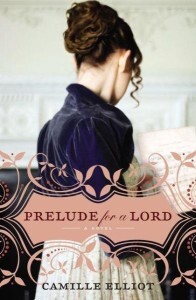 Camy here! When I wrote Prelude for a Lord, I admit I put Lord Dommick’s home in there deliberately.
Camy here! When I wrote Prelude for a Lord, I admit I put Lord Dommick’s home in there deliberately.I had visited Newstead Abbey in Nottingham, England, and fell in LOVE, and I knew I wanted to have that house and grounds in my book somehow. So when coming up with Dommick’s character and family, I modeled his family seat, Terralton Abbey, after Newstead Abbey, which was the home of the poet Lord Byron.

This is the front of the house, including the circular driveway that Dommick drives up to. I placed the front door a little differently but essentially Terralton Abbey looks the same.
Here is what the front of the house looked like in 1880:
This is the back of the house with one of its lovely gardens:
Here is the square pool and woody lawn area where Alethea plays with Margaret:
And here is the lovely river bank and grotto where Alethea and Dommick kiss:
Sigh! I wish I could go back there again!
The winners of the 3 copies of Prelude for a Lord are:
Lis K
Loraine Nunley
Anne Payne
Congratulations! I’ve emailed you. If you didn’t get it, please email me through my website or message me on Facebook.
I know the rest of you are crying in your Yorkshire pudding. Cheer up! You can order the book online or keep an eye out for my big giveaway next month!
Originally posted 2014-08-22 17:25:38.

June 6, 2025
Giving away some Victorian/Regency shawls
 Camy here! To celebrate the release of my debut Regency romance, Prelude for a Lord, I’m planning to hold a giveaway in September! (Originally it was mid August but another book deadline has kept me too busy to put this together. :P)
Camy here! To celebrate the release of my debut Regency romance, Prelude for a Lord, I’m planning to hold a giveaway in September! (Originally it was mid August but another book deadline has kept me too busy to put this together. :P)I wanted to do something neat so I’m going to be giving away some Jane Austen tea (a tea blend from the Jane Austen Centre in Bath, England), a violin ornament (since Prelude for a Lord is about a mysterious Stradivarius violin), and an autographed copy of the book.

But I also wanted something really special to give away, so I’ve spent the last several months knitting! I’ve knit 4 (finishing up the 5th) lace shawls to give away!
I picked patterns that were published in the early Victorian era, but most of the patterns were most likely in use in Jane Austen’s time (in the Regency era), they just weren’t published in a book or pamphlet—they were probably passed down from mother to daughter verbally. The yarns I’ve used are definitely modern lace yarns—very fine wool, a wool/silk blend, one mohair yarn, and an alpaca yarn—dyed with vibrant colors that I doubt Jane Austen ever saw. 
After knitting, I blocked the shawls by washing and dampening them (carefully so they don’t felt) and then pinning them into shape so they have nice points to the edging. Here’s one of the shawls I’ll be giving away:
Sign up for my email newsletter so you’ll be informed when the contest starts! Head to CamilleElliot.com and fill out the form on the right side. When my contest is live, you’ll get an email to let you know how to enter.
I’m also giving away three copies of this book to Regency blog readers who join my newsletter! So join my Camille Elliot email newsletter and then leave a comment here to let me know you joined it, or if you already belong to my newsletter.
Originally posted 2014-08-18 05:00:37.

Kombucha Tea and the Scandalous Violin with Camille Elliot author of Prelude for a Lord
I have the pleasure of welcoming one of our own, Camy Tang, to my southern porch. Camy, you are here on a very good day the humidity has dissipated, and I think I feel a breeze. So let’s get into this wonderful new book, Prelude for a Lord.

Tell me about the heroine, Alethea Sutherton. Some have told me she’s awkward and scandalous. Now that is an accomplishment.
Lady Alethea has felt alone and unloved for most of her life except for two people, her half-sister and her neighbor, Lady Arkright. After her sister is forced to move away and Lady Arkright dies, Alethea feels adrift. Her music is her solace, but because musical circles and instruction is limited in England, she is determined to find a way to move to Italy, where she can play and learn the violin without censure.
Wanting to travel doesn’t sound too scandalous. Can you tell me more of why she feels censured?
In Regency England, however, the violin is considered an inappropriate instrument for a lady.
Really? Mental note: Get my daughter back to the pianoforte, no violin. Oh, go on Camy and tell me more. I’ll get you another cup of Kombucha tea, unless that is also too scandalous.
It wasn’t until I started researching violin players in the Georgian and Regency era that I discovered that most Englishmen considered women playing the violin as incredibly unladylike because it raised the arms above her head and exposed her armpits. Can you believe that??? That’s why the pianoforte and the floor harp were considered ladylike instruments, because a woman’s arms never rose too high up. There was a child prodigy violinist who played in England a few years after the Regency era who was absolutely brilliant, but she ran into criticisms that her choice of instrument was scandalous.
So, given that the violin was scandalous, of course I had to write about a woman who played it.
Ok, it’s hero time. Tell me about Lord Dommick. Is he tall, dark and handsome?
Lord Dommick is incredibly loyal and loving to his mother and sister. He is also brilliant as a musician, but like most people during that time period, his views of women musicians are limited to pianoforte and harp players and singers. He considers Lady Alethea scandalous, which is what he needs to avoid after his ex-fiance destroyed his reputation after he returned emotionally scarred from war. He needs to repair his reputation in order to assure his sister’s comeout in London in the spring.
His love for his sister drives his concern for his reputation, but it also blinds him to how he is trying to solve everything on his own. His faith is just a byword and doesn’t impact his daily life until he has nothing left to depend upon.
But is he handsome? Can get a cute and brooding?
Yes, and he is brooding.
Okay, brooding can go a long way. Camy Tang books are known for high-kick bottom action, what drew you to the Regency.
I have been reading Regency romances since I was 13 years old, and I’ve read hundreds if not thousands of them since. I got them mostly from garage sales or thrift stores or eBay auctions. Nowadays, I buy them on ebook.
I even read some Regency research books just for fun (!!!) but never seriously considered writing one until my editor at Zondervan (and a fellow Regency romance lover) dared me to write one.
I actually got this idea about a recluse musician many years ago, but never thought about writing it until I was coming up with the plot for Prelude for a Lord. I had a scene in my head where the hero plays with the heroine for the first time, and it’s magical. They both discover things about the other during that rehearsal time. My story pretty much started from that one scene and then the other characters and the mysterious violin appeared.
No wonder your love of the Regency has led to the development of Camille Elliot. If you ever see me writing chocolate jingles, just buy the bars and say nothing. It will be our secret. Seriously, I think it’s wonderful for a passion to come to life, to be birthed from things that touch our hearts. I know you impart pieces of your journey into your characters. How did your Christian Walk affect Lady Althea and Lord Dommick?
My characters almost always have a spiritual arc that is born from my own spiritual struggles. In Protection for Hire, my romantic suspense, I wrote about my own experiences when I had first become a Christian in college and was struggling with how to move forward in newness in Christ after all the terrible things I’d done in my life. In Prelude for a Lord, the heroine feels incredibly alone because of the things in her past that have shaped her, which mirrors how I felt for many years before I became a Christian. Even now, I struggle to remember the truth that God loves me incredibly deeply and He has never left me alone.
That is a great message everyone needs to read and feel. I am realizing many miss this. Hopefully, books like Prelude to a Lord will help. Is Prelude to a Lord a series? You know Sonata to a Sultan, Treble with an Earl, well you get my question.
Yes, I hope to write 3 other books about Dommick’s friends.
I’m not sure yet if the other books in the series will be contracted by Zondervan, but if not, I’ll definitely self-publish them. If the series is contracted by Zondervan, I’ll also write another Regency series to self-publish in between the times my Zondervan books come out so that there isn’t so much time between releases. As a reader myself, I know I hate it when an author’s books are spaced too far apart!
Well Camy (Camille Elliot), thanks for stopping by and braving my pot of Kombucha. Camy will be have giveaways and other exciting things for the release of this book, but you have to tune into her newsletter for details. Go to her websites:
Camy writes Christian romantic suspense as Camy Tang and Regency romance under her pen name, Camille Elliot. She grew up in Hawaii but now lives in northern California with her engineer husband and rambunctious dog. She graduated from Stanford University in psychology with a focus on biology, and for nine years she worked as a biologist researcher. Then God guided her path in a completely different direction and now she’s writing full time, using her original psychology degree as she creates the characters in her novels. In her free time, she’s a staff worker for her church youth group and leads one of her church’s Sunday worship teams. She also loves to knit, spin wool into yarn, and is training to (very slowly) run a marathon.
Originally posted 2014-08-14 09:00:00.


